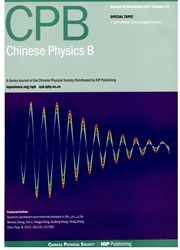

 中文摘要:
中文摘要:
Femtosecond time-resolved coherent anti-Stokes Raman scattering (CARS) spectroscopy is used to investigate gaseous molecular dynamics.Due to the spectrally broad laser pulses,usually poorly resolved spectra result from this broad spectroscopy.However,it can be demonstrated that by the electronic resonance enhancement optimization control a selective excitation of specific vibrational mode is possible.Using an electronically resonance-enhanced effect,iodine molecule specific CARS spectroscopy can be obtained from a mixture of iodine-air at room temperature and a pressure of 1 atm (corresponding to a saturation iodine vapour as low as about 35 Pa).The dynamics on either the electronically excited state or the ground state of iodine molecules obtained is consistent with previous studies (vacuum,heated and pure iodine) in the femtosecond time resolved CARS spectroscopy,showing that an effective method of suppressing the non-resonant CARS background and other interferences is demonstrated.
 英文摘要:
英文摘要:
Femtosecond time-resolved coherent anti-Stokes Raman scattering (CARS) spectroscopy is used to investigate gaseous molecular dynamics. Due to the spectrally broad laser pulses, usually poorly resolved spectra result from this broad spectroscopy. However, it can be demonstrated that by the electronic resonance enhancement optimization control a selective excitation of specific vibrational mode is possible. Using an electronically resonance-enhanced effect, iodine molecule specific CARS spectroscopy can be obtained from a mixture of iodine-air at room temperature and a pressure of 1 atm (corresponding to a saturation iodine vapour as low as about 35 Pa). The dynamics on either the electronically excited state or the ground state of iodine molecules obtained is consistent with previous studies (vacuum, heated and pure iodine) in the femtoseeond time resolved CARS spectroscopy, showing that an effective method of suppressing the non-resonant CARS background and other interferences is demonstrated.
 同期刊论文项目
同期刊论文项目
 同项目期刊论文
同项目期刊论文
 Highly efficient and photostable solid-state dye lasers based on modified copolymers doped with PM56
Highly efficient and photostable solid-state dye lasers based on modified copolymers doped with PM56 Tunable solid-state laser based on modified polymethyl methacrylate with methanol doped with Pyrrome
Tunable solid-state laser based on modified polymethyl methacrylate with methanol doped with Pyrrome Highly efficient and photostable solid-state dye lasers doped with PM567 with the addition of Tinuvi
Highly efficient and photostable solid-state dye lasers doped with PM567 with the addition of Tinuvi Tunable narrow linewidth laser output from PM567 doped nematic liquid crystal under holographic pump
Tunable narrow linewidth laser output from PM567 doped nematic liquid crystal under holographic pump Selective excitation of molecular mode in a mixture by femtosecond resonance-enhanced coherent anti-
Selective excitation of molecular mode in a mixture by femtosecond resonance-enhanced coherent anti- 期刊信息
期刊信息
